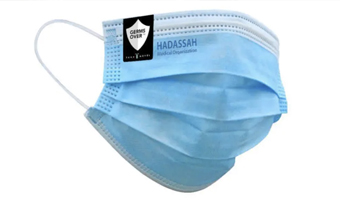Can the spread of COVID-19 be slowed as scientists race to find a cure?
Featured on a webinar hosted by David Bernstein, president of the Jewish Council for Public Affairs, and Janice Weinman, chief executive officer of Hadassah, Prof. Yoram Weiss, director of Hadassah Hospital Ein Kerem, told viewers how Israel and Hadassah have so far successfully stopped COVID-19 from raging, despite the recent opening up of the country.
Prof. Weiss noted on this May 20 webinar that "Israel is mostly free of COVID-19 at this time." There are only up to 20 new cases per day throughout the entire country.
Describing Israel’s COVID-19 strategy, Prof. Weiss related that the Israeli government has taken "draconic measures" to track and trace COVID-19's path. For example, Israelis who were found to have been in contact with someone who tested positive for the coronavirus are alerted on their cell phones to quarantine themselves for two weeks. Prof. Weiss noted that the Palestinian Authority also took drastic measures to control the outbreak through strict quarantine directives. He emphasized that Israel did not open the country until the number of new COVID-19 cases had dwindled.
During the COVID-19 crisis, Prof. Weiss reported, Hadassah Hospital Ein Kerem admitted 1,129 patients to its "biological" emergency room, which was reserved for those exhibiting respiratory problems and suspected of possibly having COVID-19. Of those patients, only 88 tested positive for the coronavirus. Prof. Weiss emphasized the need for every hospital to have this duplicate infrastructure so that both COVID-19 and non-COVID-19 patients can safely get quality medical care.
"The literature is filled with cases of people who did not receive the treatment they needed for heart attack, stroke, and cancer during the first two months of the coronavirus outbreak," Prof. Weiss reported, noting that "these things should not happen."
Hadassah, Prof. Weiss emphasized, has been a role model for the country in tackling the virus. Twice a day, Hadassah's strategic management team meets, including all key stakeholders who contribute to hospital activity concerning COVID-19. They discuss the prevalence of COVID-19 in the local communities, patient and staff safety, and the availability of protective equipment, as well as hospital infrastructure and the potential need to open new departments for COVID-19 patients. In all, 130 beds were allocated for COVID-19 patients.
Throughout the crisis, Hadassah's top management has been fully accessible to hospital staff members, Prof. Weiss said. In addition, Hadassah was the first in Israel to begin testing staff every five days. Hadassah's staff has felt cared for and, as Prof. Weiss reported, Hadassah was "overflowing with volunteers offering to work in the COVID-19 units."
Hadassah also became one of the leading centers for coronavirus testing, with the capability to perform 3,000 tests a day, Prof. Weiss said. In addition, Hadassah, with its home-made disinfectant, Hadasol, "became the major provider of hand sanitizer for the state of Israel and other hospitals," Prof. Weiss related.
Another precautionary measure Hadassah took was to ensure that all patients and authorized visitors to the hospital had their temperature taken before being allowed to pass through the entryway into the hospital. They were also given masks, gloves, hand sanitizer, and safety instructions.
Bridge to Peace Through Medicine
Prof. Weiss discussed Hadassah's important mission as a bridge to peace through medicine. Highlighting The Washington Post article, "An Arab Doctor and an Ultra-Orthodox Jew Find Common Ground in a COVID Ward," he explained that Hadassah's reputation as an island of peace is exemplified in the cooperative efforts of Arabs and Jews in the COVID-19 units. In addition, Hadassah International has shared Hadassah Hospital's medical protocols for keeping both staff and patients safe with many countries around the globe.
Israeli engineers, in partnership with Hadassah, have created low-cost ventilators that can be mass produced for under $1,000 per unit. The plans for building these low-tech ventilators are available on the internet for anyone to replicate, Prof. Weiss said, noting that some South American countries have already done so.
Research
To date, Prof. Weiss reported, 25 coronavirus studies have been approved at Hadassah, with 13 more on their way to approval. Hadassah is participating in a World Health Organization(WHO) trial with the drug Remdesivir for treating severely ill COVID-19 patients. The medicine, first developed to fight the Ebola virus, attacks coronavirus cells, rendering them nonfunctional so that the virus is no longer infectious. Other medicines being tested stop the formation of the virus, while others block the virus from penetrating a person's cells. Hadassah also partnered with SodaStream to develop high-flow oxygen systems to help COVID-19 patients breathe.
At the same time, Hadassah collected plasma from recovered COVID-19 patients to treat others who are severely ill. Prof. Weiss noted that the plasma collection came from ultra-orthodox communities where the rate of infection was high. Another immunotherapy approach is Hadassah's early-stage clinical trial that involves enriching COVID-19-specific T cells of the immune system from recovered COVID-19 patients to treat others who are severely ill with the virus.
To understand the disparity among people in their ability to fight off the virus, Hadassah is studying blood samples of COVID-19 to identify biomarkers that make people more susceptible or more resistant to the disease.
Looking to the Future
Despite its success, Israel is alert to the possibility of a COVID-19 second wave. As Prof. Weiss explained, one of the challenges is that 75 to 80 percent of a population needs either to have antibodies to COVID-19 or have been vaccinated for there to be herd immunity. Since Israel’s population was not infected to anywhere near that extent, Israel could not achieve this immunity. Furthermore, Prof. Weiss says, "We don’t know yet how long antibodies will provide immunity to recovered COVID-19 patients."
In concluding his talk, Prof. Weiss said, "You can talk about infrastructure. You can talk about science. But in the end, what makes a medical institution or a country work is its people."
Read More: Coronavirus Updates from Israel and in Our Communities.









